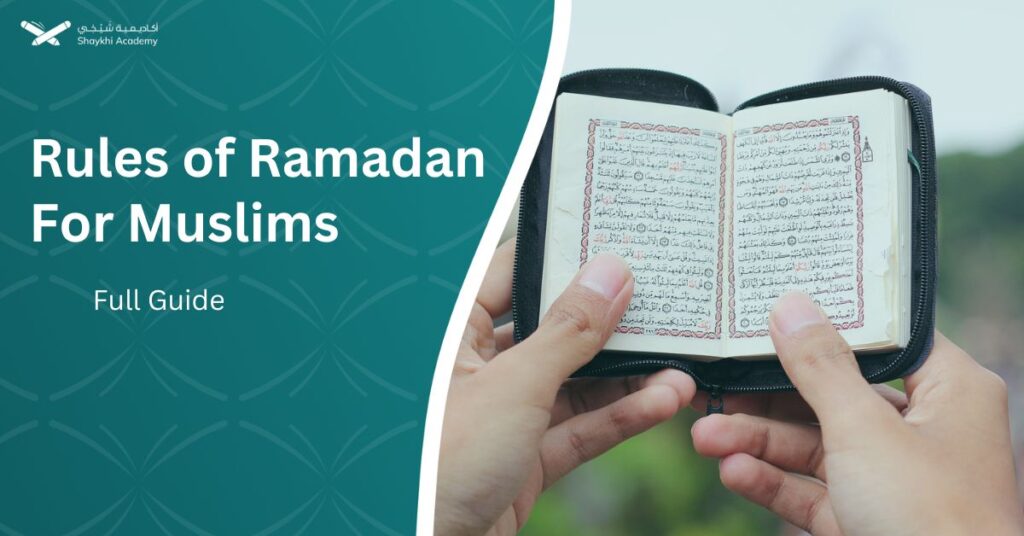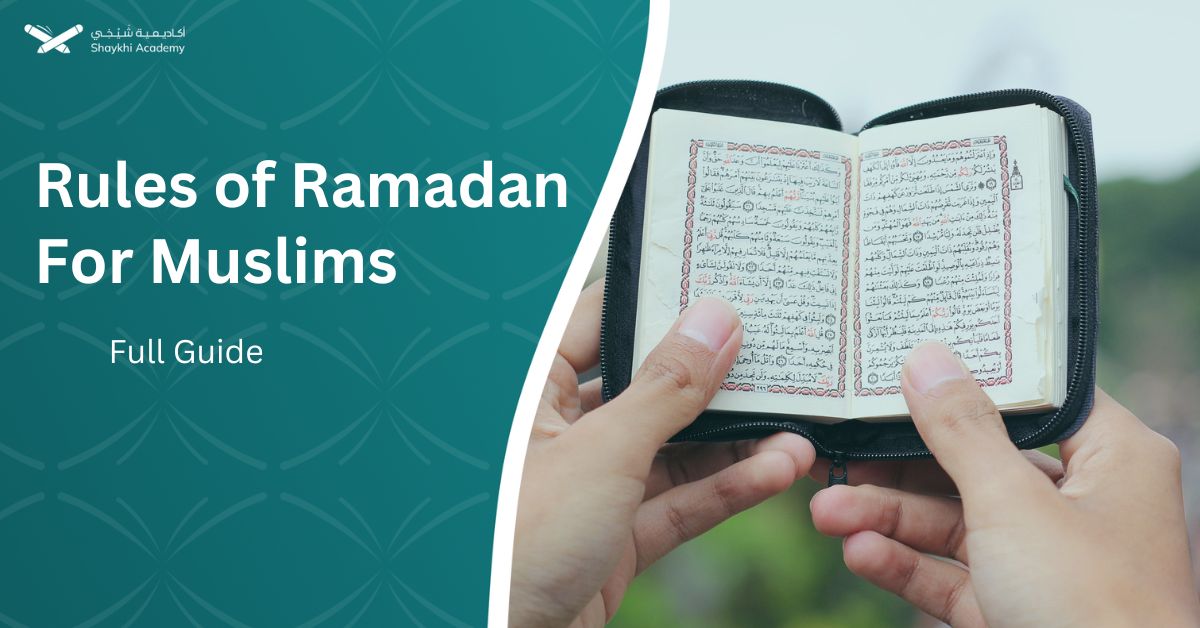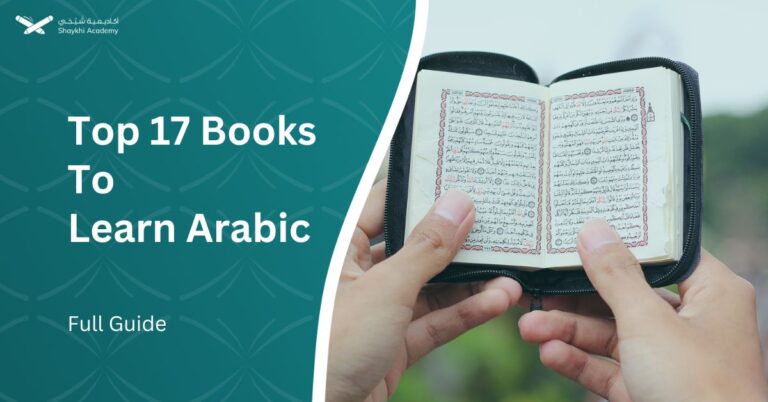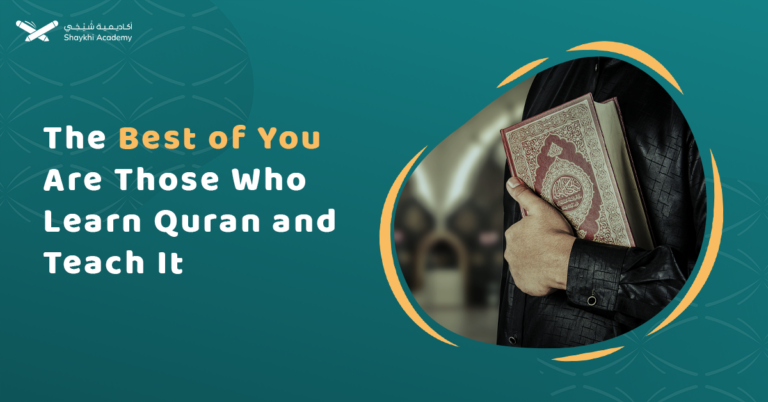Ramadan is the Holy month of Muslims and one of the best times of the year when Muslims can gain a great deal of blessings and rewards in the near life and the hereafter. In this article, we will discuss everything about the rules of Ramadan. We will also explore the morals and the spiritual and physical benefits of fasting. If you are a new Muslim you might wonder why is the month of Ramadan so special, and what are the rules and acts of worship that distinguish the month of Ramadan from the rest of the year?

Additionally, we will learn why Ramadan is important, who observes Ramadan, and how to take advantage of every minute of the blessed month.
What is Ramadan?
Ramadan is the ninth month of the lunar year. The month of Ramadan gains its importance from the fact that it is the month in which Allah Subhanahu wa ta’ala revealed the Quran to the Prophet Muhammad Peace and Blessings Be Upon Him.
Additionally, Ramadan is the month in which Muslims are obliged to perform fasting, which is the fourth fundamental pillar of Islam.
Allah Subhanahu wa ta’ala said in the Quran:
“The month of Ramadhan [is that] in which was revealed the Qur’an, a guidance for the people and clear proofs of guidance and criterion. So whoever sights [the new moon of] the month, let him fast it; and whoever is ill or on a journey – then an equal number of other days. Allah intends for you ease and does not intend for you hardship and [wants] for you to complete the period and to glorify Allah for that [to] which He has guided you; and perhaps you will be grateful”. (Verse 185, surah Al-Baqarah)
When is Ramadan 2024?
Ramadan is considered the ninth month of the Hijri calendar, lying between Shaban and Shawwal. It comes exactly before the Al-Fitr feast.The Moon sighting for Ramadan 2024 will be on the night of Sunday the tenth of March 2024. This means that Ramadan is expected to be on either Monday the twelfth of March, or Tuesday the thirteenth of March 2024, based on the moon sightings in each country.
Ramadan in 2024 is anticipated to commence at sundown on Sunday, March 10th, and conclude at sundown on Tuesday, April 9th. However, the exact start and end dates may vary depending on the sighting of the first crescent Moon, particularly over Mecca, Saudi Arabia.
Therefore, while calculations suggest March 10th as the beginning of Ramadan 2024, it could officially start on March 11th, depending on the moon sighting. Similarly, Eid al-Fitr, marking the end of Ramadan, is expected to be celebrated on Wednesday, April 10th, 2024. These dates are subject to change based on lunar observations and may vary slightly from region to region.
What is Ramadan Actually About?
Ramadan is a sacred month in Islam that emphasizes spiritual reflection, self-discipline, and devotion to Allah. It is about abstaining from food, drink, and other physical needs from dawn until sunset as an act of worship and self-control. Beyond fasting, Ramadan is also about increasing acts of worship, such as prayer, reading the Quran, and engaging in charitable deeds.
Ramadan is a time for Muslims to seek forgiveness, strengthen their relationship with Allah, and cultivate empathy and compassion towards others. Ultimately, Ramadan is a period of spiritual growth, renewal, and connection with one’s faith, community, and Creator.
Islamic faith is all about the complete submission to the will of God. Hence; Muslims lovingly follow the obligations of Allah even without obviously realizing the wisdom behind them.
Definition of Rules of Ramadan for Beginners
The rules of Ramadan is the dos and don’ts that you should follow as a Muslim in order to achieve Allah’s acceptance and pleasure during the Holy month.
The rules of Ramadan refer to the guidelines and principles that Muslims should adhere to during the holy month in order to attain Allah’s acceptance and blessings. These rules encompass both obligatory actions (dos) and prohibited actions (don’ts) that are outlined in Islamic teachings.
Rules of Ramadan include fasting from dawn until sunset, abstaining from food, drink, smoking, and marital relations during fasting hours, as well as refraining from sinful behavior such as lying, backbiting, and engaging in arguments. Additionally, Muslims are encouraged to increase their acts of worship, such as performing extra prayers (Taraweeh), reading and reflecting on the Quran, giving charity, and seeking forgiveness. Adhering to these rules not only fulfills the religious obligation of fasting but also facilitates spiritual growth, self-discipline, and mindfulness throughout the month of Ramadan.
Why do the Dates of Ramadan change every year?
The dates of Ramadan change every year in relation to the Christian calendar since the Hijri month (Lunar month) is either 29 or 30 days depending on whether or not the crescent moon of the new month could be detected by scholars.
Hence, a lunar year usually ranges from 354 to 355 days, unlike the solar year (Christian year) which is either 365 or 366 days.
What is allowed during Ramadan?
All Lawfull things in Islam are allowed during Ramadan except eating and drinking during, and having sexual intercourse during the day time in Ramadan. Allah Almighty said in Surah Al-Baqarah, verse 187:
“It has been made permissible for you the night preceding fasting to go to your wives [for sexual relations]. They are clothing for you and you are clothing for them. Allah knows that you used to deceive yourselves, so He accepted your repentance and forgave you. So now, have relations with them and seek that which Allah has decreed for you. And eat and drink until the white thread of dawn becomes distinct to you from the black thread [of night]. Then complete the fast until the sunset. And do not have relations with them as long as you are staying for worship in the mosques. These are the limits [set by] Allah, so do not approach them. Thus does Allah make clear His ordinances to the people that they may become righteous”.
During Ramadan, all adult Muslims are supposed to strictly fast from dawn until nightfall. This means that all sorts of food and beverages including water, as well as sexual activity, are prohibited during the day hours of the 29-30 days of Ramadan.
Exemptions for Not Fasting Ramadan
There are some Exemptions for Not Fasting Ramadan here are the top cases:
1. People with physical or mental Illness
One of the excuses that Muslims could have that exempts them from fasting Ramadan is the presence of a disabling physical or mental illness.
This usually requires the advice of a specialized doctor to decide whether fasting can cause the person any potential harm or not. In this case, ill persons can make up for the missed days either by Fasting other days or paying Kaffarah, according to their specific medical condition.
2. Travelers
Travelers may be exempted from fasting the day of Ramadan depending on four factors that can be summarized as follows:
- Distance: The distance That exempts travelers from fasting is equal to the distance of shortening the salat.
- Duration: The duration in which the traveler will be staying in the destination country should not exceed three days. Otherwise, the traveler should resume fasting after reaching his destination.
- Exceedance: The Travener should be going beyond the limits of the city in which he is staying.
- Intentionality: According to the majority of scholars, traveling for unlawful reasons, such as gambling trips, does not allow the traveler to break his fast.
3. Females during menstruation or postpartum bleeding
Menstruating Females, and females who still have their postpartum bleeding Should abandon fasting and make up for the missing days after purity.
4. Breastfeeding females
Females who believe fasting could negatively affect their health or the health of their babies are excused from fasting. And are expected to make up for their missed days later.
Read also: Can You Take Naps During Ramadan?
What is not allowed during Ramadan?
Muslim during Ramadan are not allowed to eat, drink, and having sexual activity from dawn until sunset during the daytime in Ramadan. Fasting entails the complete abstinence from these three activities (foot, drink and sex)/
Moreover, many other things that come into or out of the body can invalidate fasting, such as oral medications that reach the stomach, deliberate vomiting, parenteral nutrition, and others.
In addition to that, Muslims are obliged to refrain from bad habits such as smoking, gambling, arguing, fighting, and gossiping, as well as all other sins and bad deeds.
If you have a kid, here is a detailed guide on Ramadan Rules for Kids: Age, Eating, Fasting, Drinking, and More.
Why Is Ramadan Important?
Ramadan holds immense importance as it serves as a spiritual journey that purifies both the body and soul. Through fasting, Muslims not only detoxify their bodies but also cleanse their hearts from negative traits like envy and pride, aligning their desires with the will of Allah.
Ramadan fosters sincerity and a constant awareness of Allah’s presence, while also instilling empathy towards the less fortunate. Additionally, beyond its spiritual significance, Ramadan fasting offers notable health benefits, including weight loss and improved blood sugar control, underscoring its holistic impact on well-being.
Here is the top importance in details:
1. Fasting Purifies the soul
In addition to purifying our bodies from toxins, Ramadan fasting also purifies our souls. It helps us overcome the diseases of the heart including envy, anger, greed, pride, and others.
2. Putting God’s Pleasure above one’s own desires
One of the morals behind fasting is being free from slavery to matter. During fasting Muslims abstain from pleasures that are considered Halal (allowed) during the rest of the year. This helps them prioritize the will of Allah over their personal pleasures.
3. Learning Sincerity and Observing God Almighty
Fasting reminds us that Allah Almighty is always watching us. It helps us develop a sense of observance (also known as Muraqabah). In other words, fasting as a worship entails a great deal of sincerity and watchfulness of Allah in secret as well as in public.
4. Sympathizing With the Less Fortunate People
Fasting makes us appreciate the blessings of Allah. Feeling hungry reminds us of how poor people need our help and support, and raises our sense of responsibility towards the poor and less fortunate people.
5. Health Benefits of Ramadan Fasting
Recently, many studies have shown the numerous health benefits of fasting. These benefits include loss of weight, controlling blood sugar levels, prevention of cancer, as well as protection against neurodegenerative diseases.
What Is a Typical Day Like During Ramadan?
Although a typical day in Ramadan may slightly differ according to the special traditions of each country, Muslims around the globe share common features that make the holy month of Ramadan more special than other days of the year. Let us now explore how Muslims usually spend their time during Ramadan.
1. The Pre-dawn Meal
During Ramadan Muslims fast from dawn to sunset. Typically, they start their day, around 3:00 am, by preparing the pre-dawn meal also known as “Suhoor”.
This meal usually contains protein-rich foods and plenty of water to prevent feeling hungry or dehydrated during the fasting hours which may extend to around 14 hours.
2. Al-Fajr Prayers (Dawn Prayer)
After having “Suhoor”, Muslims make wudu’ to perform Dawn prayers. After which they spend some time reading the Quran and morning zikr till the time of sunrise.
3. Performing Duha Prayer
It is preferable to pray two Rakat after sunrise, these Rakat are known as Al-Duha prayer.
Prophet Muhammad may Allah’s peace and blessings be upon him said:
“In the morning, charity is due on every joint bone of the body of every one of you. Every utterance of Allah’s Glorification (i.e., saying Subhan Allah) is an act of charity, and every utterance of His Praise (i.e., saying Al-hamdu lillah) is an act of charity and every utterance of declaration of His Greatness (i.e., saying La ilaha illAllah) is an act of charity; and enjoining M’aruf (good) is an act of charity, and forbidding Munkar (evil) is an act of charity, and two Rak’ah Duha prayers which one performs in the forenoon is equal to all this (in reward).” [Muslim].
4. Working Hours During Ramadan
In most Islamic countries, working days become shorter during Ramadan to facilitate fasting and give a chance for Muslims to perform other acts of worship. Thus, working hours usually start around 9:00 am and extend to Al-Asr prayer (around 3:00 pm).
5. Pre-Iftar Supplication
The few hours before sunset are the golden hours to make duaa, since prophet Muhammad Peace and blessings be upon him said:
“There are three whose supplications are not turned back: A just ruler, and a fasting person until he breaks his fast. And, the supplication of one who has been wronged is raised by Allah up to the clouds on the Day of Resurrection, and the gates of heaven are opened for it, and Allah says, ‘By My Might, I will help you (against the wrongdoer) even if it is after a while”.
6. Al-Iftar and Sunset Prayers
When Muslims hear the calls for sunset prayers, they break their fasting by eating a few dates and sips of milk, Then they perform sunset prayers. Next, they proceed to eat Al-Iftar meal.
7. Family Gatherings During Ramadan
Ramadan is a chance for the Muslim families to gather around the Iftar table. It also helps strengthen the bonds between members of the Muslim community through charity and sharing Iftar meals with the poor.
Prophet Muhammad peace and blessings be upon him promised a double reward for those who share their Iftar meals with others as he said, “He who provides a fasting person something with which to break his fast, will earn the same reward as the one who was observing the fast, without diminishing in any way the reward of the latter.” [At-Tirmidhi].
8. Night Prayers and Taraweeh
One of the most prominent features of Ramadan in Muslim countries is the night prayers and the Taraweeh.
Taraweeh is a voluntary night prayer that Muslims perform after Al-Ishaa’ prayer. Though non-compulsory Muslims are encouraged to Perform these prayers due to the greatness of their reward.
It was narrated from Abu Hurayrah that the Messenger of Allah (blessings and peace of Allah be upon him) said: “Whoever prays at night during Ramadan out of faith and in the hope of reward, his previous sins will be forgiven”.
How does Ramadan end?
After the sunset prayer of the twenty-ninth day of Ramadan, Muslim scholars in each country detect the crescent moon of Shawwal. In case the crescent is seen, this means that Ramadan has ended and that the Al-Fitr feast is on the next day.
Want to Learn More? Join Shaykhi Today!
If you are a new Muslim, or even a non-Muslim who is eager to discover more about Islam. Do not miss the chance! Join us now, or scroll down through our wide range of online Islamic studies courses and choose the one that suits you best.
If you have any inquiries concerning our online programs, do not hesitate to reach out to Shaykhi Online Academy’s student support center for further help.
Summary
The month of Ramadan carries a breeze of mercy and blessings to which Muslims should expose themselves. It is a chance to revive our Iman and achieve the forgiveness of Allah.
Learning the rules and regulations of Ramadan helps you make the best out of this holy month and become one of the winners of the treasures of blessings and rewards that Allah Subhanahu wa ta’ala promised.

































